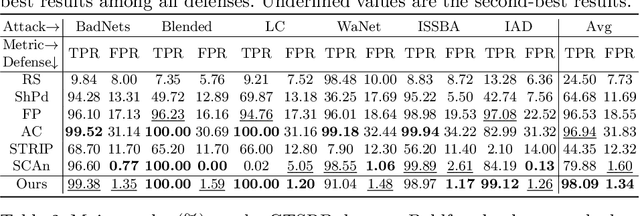Najeeb Moharram Jebreel
Defending Against Backdoor Attacks by Layer-wise Feature Analysis
Feb 24, 2023



Abstract:Training deep neural networks (DNNs) usually requires massive training data and computational resources. Users who cannot afford this may prefer to outsource training to a third party or resort to publicly available pre-trained models. Unfortunately, doing so facilitates a new training-time attack (i.e., backdoor attack) against DNNs. This attack aims to induce misclassification of input samples containing adversary-specified trigger patterns. In this paper, we first conduct a layer-wise feature analysis of poisoned and benign samples from the target class. We find out that the feature difference between benign and poisoned samples tends to be maximum at a critical layer, which is not always the one typically used in existing defenses, namely the layer before fully-connected layers. We also demonstrate how to locate this critical layer based on the behaviors of benign samples. We then propose a simple yet effective method to filter poisoned samples by analyzing the feature differences between suspicious and benign samples at the critical layer. We conduct extensive experiments on two benchmark datasets, which confirm the effectiveness of our defense.
Enhanced Security and Privacy via Fragmented Federated Learning
Jul 13, 2022



Abstract:In federated learning (FL), a set of participants share updates computed on their local data with an aggregator server that combines updates into a global model. However, reconciling accuracy with privacy and security is a challenge to FL. On the one hand, good updates sent by honest participants may reveal their private local information, whereas poisoned updates sent by malicious participants may compromise the model's availability and/or integrity. On the other hand, enhancing privacy via update distortion damages accuracy, whereas doing so via update aggregation damages security because it does not allow the server to filter out individual poisoned updates. To tackle the accuracy-privacy-security conflict, we propose {\em fragmented federated learning} (FFL), in which participants randomly exchange and mix fragments of their updates before sending them to the server. To achieve privacy, we design a lightweight protocol that allows participants to privately exchange and mix encrypted fragments of their updates so that the server can neither obtain individual updates nor link them to their originators. To achieve security, we design a reputation-based defense tailored for FFL that builds trust in participants and their mixed updates based on the quality of the fragments they exchange and the mixed updates they send. Since the exchanged fragments' parameters keep their original coordinates and attackers can be neutralized, the server can correctly reconstruct a global model from the received mixed updates without accuracy loss. Experiments on four real data sets show that FFL can prevent semi-honest servers from mounting privacy attacks, can effectively counter poisoning attacks and can keep the accuracy of the global model.
Defending against the Label-flipping Attack in Federated Learning
Jul 05, 2022



Abstract:Federated learning (FL) provides autonomy and privacy by design to participating peers, who cooperatively build a machine learning (ML) model while keeping their private data in their devices. However, that same autonomy opens the door for malicious peers to poison the model by conducting either untargeted or targeted poisoning attacks. The label-flipping (LF) attack is a targeted poisoning attack where the attackers poison their training data by flipping the labels of some examples from one class (i.e., the source class) to another (i.e., the target class). Unfortunately, this attack is easy to perform and hard to detect and it negatively impacts on the performance of the global model. Existing defenses against LF are limited by assumptions on the distribution of the peers' data and/or do not perform well with high-dimensional models. In this paper, we deeply investigate the LF attack behavior and find that the contradicting objectives of attackers and honest peers on the source class examples are reflected in the parameter gradients corresponding to the neurons of the source and target classes in the output layer, making those gradients good discriminative features for the attack detection. Accordingly, we propose a novel defense that first dynamically extracts those gradients from the peers' local updates, and then clusters the extracted gradients, analyzes the resulting clusters and filters out potential bad updates before model aggregation. Extensive empirical analysis on three data sets shows the proposed defense's effectiveness against the LF attack regardless of the data distribution or model dimensionality. Also, the proposed defense outperforms several state-of-the-art defenses by offering lower test error, higher overall accuracy, higher source class accuracy, lower attack success rate, and higher stability of the source class accuracy.
 Add to Chrome
Add to Chrome Add to Firefox
Add to Firefox Add to Edge
Add to Edge